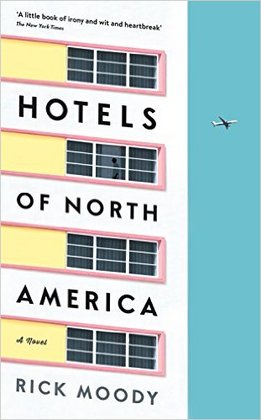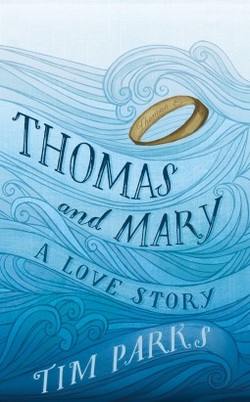While I enjoyed meeting Reg through a series of hotel rooms, this novel, as with some hotels have stayed in, didn’t deliver as much as I’d hoped. It wasn’t quite funny enough, nor was the narrator’s character quite wackily self-regarding enough, nor his life quite interesting or tragic enough, to be The Accidental Tourist (my all-time favourite Anne Tyler novel) of the digital age. The afterword by Rick Moody, detailing his failed attempts to track down the author of the reviews with the self-conscious pretence this is not fiction added nothing to my reading experience. Nevertheless a pleasant enough read. Thanks to Serpent’s Tail for my review copy.
############################################################
Thomas and Mary got together as students but now, two children and a dog later, their marriage is falling apart. As in Hot Milk, the symbolism is writ large from the first chapter when Thomas loses his wedding ring on the beach. There follows a chapter on uncoordinated bedtimes guaranteed to make anyone who’s ever been in a long-term relationship cringe. The forensic examination of the small pleasures (actually, not very many by this stage of the relationship) and multiple irritations that make up a shared life provides the humour of this novel, the struggle to commit to either the marriage or separation its poignancy.
Thomas in particular is an indecisive fellow, fraught with guilt at his continual affairs but somehow unable to take full responsibility for his actions. I was totally convinced by the chapter on his vicarage childhood, with his attempts not to disappoint his parents as his older siblings have done (his sister with her poor academic record, his brother with his rejection of the church) severely restricting his psychological growth resulting in a false self.
I had mixed feelings about the couple therapy and references to his analyst – although, to be fair, my standards are somewhat exacting – but decided that the chapter “Shrink” qualifies the novel as number 23 in my series on fictional therapists. I enjoyed the dialogue between client and therapist, progressing from Thomas’s resentment at the Christmas break to some kind of epiphany, despite the therapist’s unprofessional chain-smoking (reminding me of a photograph of the famous psychoanalyst Hanna Segal, which unfortunately I can’t find online). I thought Tim Parks wise to avoid complicated professional distinctions by referring to her by the slang generic term “shrink”, but was disappointed that he had her ending the session by inviting Thomas to call her before next week’s meeting should he need to (p322). (Lots of readers and reviewers were disappointed when this wasn’t offered by the analyst in Hausfrau, but in my view her failure lay in not arranging alternative crisis care.)
My main criticism of Thomas and Mary is that it seems unfinished: not that there isn’t an adequate ending, but that the author hasn’t made up his mind what he wants the focus of the novel to be. While mostly related from Thomas’s point of view, albeit jumping arbitrarily from third to first person, we do see things from other perspectives. Surprisingly, given the title, Mary’s voice is missing: the one chapter which looks as if it’s her story turns out to be Thomas’s attempt to get inside her head. Yet if, alternatively, the aim of the novel is to present the modern marriage in a broad context, we need more point-of-view characters: for example, we are shown virtually nothing of what their daughter, Sally, thinks of it all. In fact, the only female character drawn in three-dimensions is Thomas’s dying mother. However, if it’s intended as Thomas’s story, which is how I read it, little would be lost by cutting those scenes shown through others’ eyes. (I found the chapter from Mary’s dog-walking friend, Julie, almost unreadable.) Although Thomas and Mary isn’t overly long, a shorter novel would have been stronger: although Thomas, despite his flaws, had my sympathy initially, I did find myself wishing he would get his act together long before the last page.
Tim Parks is the author of sixteen previous novels and ten books of non-fiction. I think there are echoes of his memoir Teach Us to Sit Still (I haven’t read it, but I’ve read a lot about it) in a later chapter exploring what it means to concentrate on music. I first came across him in the powerful novel Cleaver, and eagerly sought out his other works, loving Dreams of Rivers and Seas and being bored to death by Europa. Thomas and Mary, to my mind, wasn’t as good as the former or as bad as the latter. Thanks to Harvill Secker for providing my review copy.























 RSS Feed
RSS Feed





















